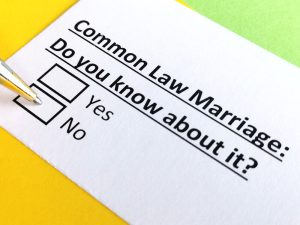Is Common Law Marriage Allowed in New Jersey?
Family Lawyers Discuss Common Law Marriages and Alternatives to Legally Protect Yourself as an Unmarried Couple in NJ.

Common Law Marriage: What Is It?
A common law marriage is a type of marriage in which a couple lives together for a certain amount of time and holds themselves out as married without going through a formal legal ceremony. In some jurisdictions, this type of relationship is recognized as a legal marriage and may have the same legal rights and responsibilities as a formal marriage. Couples often choose this kind of relationship for a mixed bag of motivations. Living together allows individuals to split the costs of housing, utilities, and other expenses, making it more affordable. It is easier for couples to live together than to maintain separate households. Sometimes, couples see living together as a way to test the waters rather than diving in willy-nilly.
Features of a Common Law Marriage
A couple that lives together, shares expenses, and refers to one another as “husband” or “wife” would indicate a common law marriage. Filing joint tax returns, taking vacations together, and having a family are other characteristics. Sharing household work, errands, and expenses and signing contracts to buy a car or home together also indicate a common law relationship.
Common Law Marriage and New Jersey Law
Common law marriage as of 1939 in the state of New Jersey no longer exists. The only way to be considered espoused is to marry through proper channels such as a justice of the peace or religious authority and register the marriage in the local government offices by getting a license. There is no way to be married in the eyes of New Jersey law without actually getting married. You can live with your partner for decades but are only married once it is performed legally. The only common law marriage recognized by the state of New Jersey is one coming from another state that meets all of the requirements for that state’s common law marriage statutes.
What Happens to Long-Term Relationship Rights?
Although the social mores have changed dramatically since common law marriage was abolished, couples are treated differently from spouses in some crucial ways. They do not have the same status as a spouse regarding worker’s compensation and insurance benefits of their partners. They cannot legally make decisions for their partner regarding healthcare (unless a power of attorney has been drawn), they cannot inherit by intestate succession, and they are excluded from financial benefits from the Wrongful Death Act. Also, government pensions, assistance, or other benefits are not afforded to them either.
If children are in the relationship, child support and visitation will be conducted as they would in a legal marriage. However, the division of assets will not necessarily be performed as it would in marital separation, and in most cases, alimony is not granted.
 In a Situation of Common Law Marriage, Am I Allowed to Demand Alimony From My Partner?
In a Situation of Common Law Marriage, Am I Allowed to Demand Alimony From My Partner?
Palimony is financial support that an unmarried person can request when the partners are splitting up. Less legislation exists in this regard, but it does provide some protection during a separation. There is no statutory framework for unmarried couples to get through support and equitable distribution issues. To have a successful claim, the facts must show that the couple was residing together for an extended period and a description of the living arrangement (who worked outside the home, how household duties were distributed, etc.) A written contract detailing the intentions of providing monetary support, signed by the person agreeing, must be submitted. Finally, a monetary amount will be requested to meet the contract’s promise. Both partners must have their own attorneys. This is not an easy battle; obtaining a written agreement with specific monetary details from a spouse, without offense, either because the signer feels obligated or the partner distrusts. It almost seems easier just to get married.
An Attorney at Montanari Law Group can Help You Protect Your Rights in Unmarried Couple Scenario
Separation from a long-time partner is devastating. No one enters into a relationship with the idea that it will be over one day. You have built a home together, and whether or not you are legally joined, the stress and sadness are the same. You need an experienced family law attorney who can represent you and your needs during your relationship and preserve your rights in the case of a separation.
The Montanari Law Group has worked with many people whose situation was similar to yours in towns such as Passaic, Hawthorne, Clifton, Hackensack, Paramus, Woodland Park, Totowa, and areas throughout Passaic, Hudson, Essex, and Bergen County. We know that every case is unique, and the issues you are facing can be emotionally overwhelming. It is for that reason our knowledge is a major advantage in providing you with the representation you need to secure the resolution you deserve.
If you are unsure if your relationship would be categorized as a common law marriage or if you have concerns about your legal options in an unmarried relationship, marriage, or divorce in New Jersey, call (973) 233-4396 or reach us online to request a confidential and free consultation.

 In a Situation of Common Law Marriage, Am I Allowed to Demand Alimony From My Partner?
In a Situation of Common Law Marriage, Am I Allowed to Demand Alimony From My Partner?